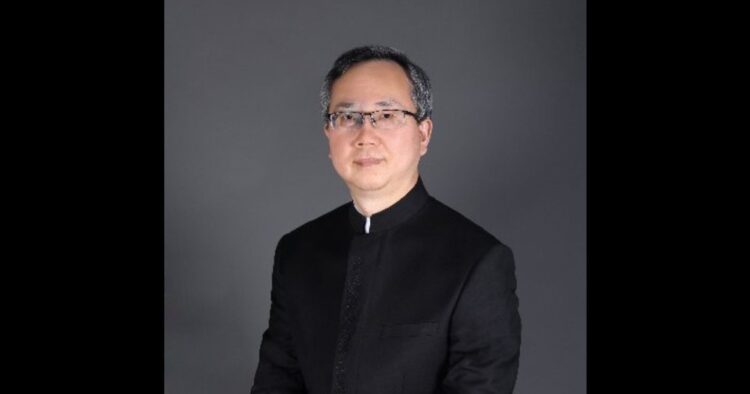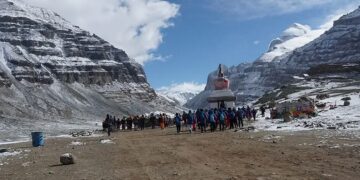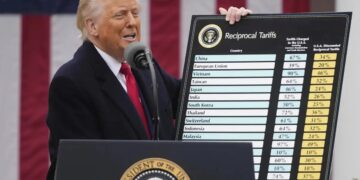In a recent exchange that has garnered widespread attention, the Chinese Ambassador to Nepal, Chen Song, faced public embarrassment after a Nepali journalist stood firm against pressure and vowed to pursue a story regarding hidden details in Chinese loans to Nepal.
The confrontation erupted when journalist Gajendra Budhathoki, Chief Editor at Taksar News, disclosed discrepancies in the information provided to Nepali citizens regarding loans for the development of Pokhara Airport.
China Ambassador to Nepal Song involved in an online brawl with Nepal Journalist Gajendra over story on China. https://t.co/lulZX8pz9O pic.twitter.com/x1DJhQxPnC
— Sidhant Sibal (@sidhant) June 1, 2024
Budhathoki revealed that while Nepalis were informed of a two percent interest rate on loans from China for Pokhara Airport, the actual rate was five percent. This revelation prompted Ambassador Song to dismiss the claims as “lies,” sparking a heated exchange.
Despite demands for an apology from Song, Budhathoki remained steadfast, asserting his intent to publish evidence supporting his claims.
पोखरा विमानस्थलका लागि लिएको ऋण २ प्रतिशत ब्याजदरको भन्दै आएका थिए । ५ प्रतिशत पो रहेछ ।
— Gajendra Budhathoki ♿ (@gbudhathoki) May 27, 2024
The situation escalated as Ambassador Song insinuated that Budhathoki may be affiliated with a ‘third party’ or working for a particular group, casting doubt on the journalist’s intentions. Refusing to back down, Budhathoki challenged Song’s attempts at intimidation, citing evidence from the Nepali Government to support his stance.
Criticism of Ambassador Song’s conduct poured in from Nepali citizens, who condemned what they perceived as an attempt to silence a journalist and interfere with freedom of expression. The incident underscored broader concerns about China’s diplomatic approach, characterized by aggressive tactics and intimidation, often referred to as “wolf warrior diplomacy.”
पोखरा विमानस्थलका लागि लिएको ऋण २ प्रतिशत ब्याजदरको भन्दै आएका थिए । ५ प्रतिशत पो रहेछ ।
— Gajendra Budhathoki ♿ (@gbudhathoki) May 27, 2024
Background on Pokhara Airport Project and Chinese Loans
The dispute over loan details for Pokhara Airport sheds light on broader issues surrounding Chinese investment in Nepal.
If you have the document, publish it. If you don't, need time to find proof, then what kind of intention is this. Spreading lies first, then wait for the tide to subside, and spread again.
— Ambassador Chen Song (@PRCAmbNepal) May 29, 2024
The airport project, inaugurated on January 1, 2023, was touted as part of China’s ambitious Belt and Road Initiative (BRI). However, Nepal’s government disputed China’s claims regarding the project’s BRI status, highlighting discrepancies between promises and realities.
Concerns about the project’s financial viability surfaced as the company operating Pokhara Airport struggled to meet loan obligations, leading to discussions about converting the loan into a grant to alleviate mounting debt.
Do not intimidate me, know your boundaries Mr. Chen, I have evidence from the Nepal Government. https://t.co/B061GIsx0y
— Gajendra Budhathoki ♿ (@gbudhathoki) May 29, 2024
Prime Minister Pushpa Kamal Dahal announced diplomatic efforts to negotiate this conversion in March 2024, following questions raised by opposition lawmakers about the project’s losses and debt accumulation.
We demand a formal apology from you and whoever people you represent
— Ambassador Chen Song (@PRCAmbNepal) May 29, 2024
Audit Findings and Corruption Allegations
The controversy surrounding Pokhara Airport intensified with the release of an audit report by Nepal’s Auditor General in March 2024. The report questioned the decision-making process behind the airport’s construction, alleging corruption and financial irregularities.
We demand a formal apology from you and whoever people you represent
— Ambassador Chen Song (@PRCAmbNepal) May 29, 2024
Finance Minister Varshaman Pun came under scrutiny for allegedly benefiting Chinese contractors and granting significant tax exemptions, leading to calls for investigation.
In November 2023, a major raid on the Chinese company involved in Pokhara Airport’s construction further fueled concerns about corruption. The raid, conducted by Nepal’s anti-corruption agency, centered on allegations of poor-quality work and commission-taking, highlighting systemic issues in project implementation.
The clash between Ambassador Song and journalist Budhathoki reflects broader challenges in Nepal’s relationship with China, particularly regarding transparency and accountability in infrastructure projects.
As scrutiny intensifies and allegations of corruption persist, there are growing calls for accountability measures and greater oversight to ensure that projects serve the interests of Nepali citizens and uphold ethical standards.

















Comments